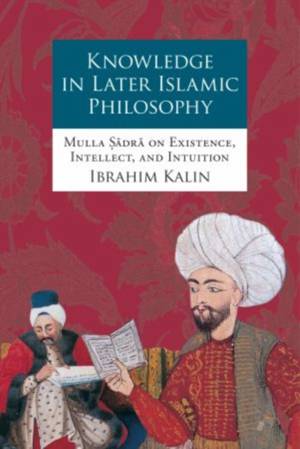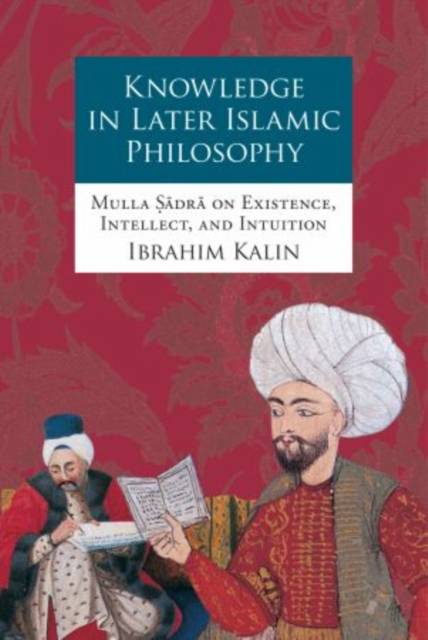
- Afhalen na 1 uur in een winkel met voorraad
- Gratis thuislevering in België vanaf € 30
- Ruim aanbod met 7 miljoen producten
- Afhalen na 1 uur in een winkel met voorraad
- Gratis thuislevering in België vanaf € 30
- Ruim aanbod met 7 miljoen producten
Zoeken
Knowledge in Later Islamic Philosophy C
Mulla Sadra on Existence, Intellect, and Intuition
Ibrahim Kalin
Hardcover | Engels
€ 149,95
+ 299 punten
Omschrijving
This study looks at how the seventeenth-century philosopher Sadr al-Din al-Shirazi, known as Mulla Sadra, attempted to reconcile the three major forms of knowledge in Islamic philosophical discourses: revelation (Qur'an), demonstration (burhan), and gnosis or intuitive knowledge ('irfan). In his grand synthesis, which he calls the 'Transcendent Wisdom', Mulla Sadra bases his epistemological considerations on a robust analysis of existence and its modalities. His key claim that knowledge is a mode of existence rejects and revises the Kalam definitions of knowledge as relation and as a property of the knower on the one hand, and the Avicennan notions of knowledge as abstraction and representation on the other. For Sadra, all these theories land us in a subjectivist theory of knowledge where the knowing subject is defined as the primary locus of all epistemic claims. To explore the possibilities of a 'non-subjectivist' epistemology, Sadra seeks to shift the focus from knowledge as a
mental act of representation to knowledge as presence and unveiling. The concept of knowledge has occupied a central place in the Islamic intellectual tradition. While Muslim philosophers have adopted the Greek ideas of knowledge, they have also developed new approaches and broadened the study of knowledge. The challenge of reconciling revealed knowledge with unaided reason and intuitive knowledge has led to an extremely productive debate among Muslims intellectuals in the classical period. In a culture where knowledge has provided both spiritual perfection and social status, Muslim scholars have created a remarkable discourse of knowledge and vastly widened the scope of what it means to know. For Sadra, in knowing things, we unveil an aspect of existence and thus engage with the countless modalities and colours of the all-inclusive reality of existence. In such a framework, we give up the subjectivist claims of ownership of meaning. The intrinsic intelligibility of existence, an
argument Sadra establishes through his elaborate ontology, strips the knowing subject of its privileged position of being the sole creator of meaning. Instead, meaning and intelligibility are defined as functions of existence to be deciphered and unveiled by the knowing subject. This leads to a redefinition of the relationship between subject and object or what Muslim philosophers call the knower and the known.
mental act of representation to knowledge as presence and unveiling. The concept of knowledge has occupied a central place in the Islamic intellectual tradition. While Muslim philosophers have adopted the Greek ideas of knowledge, they have also developed new approaches and broadened the study of knowledge. The challenge of reconciling revealed knowledge with unaided reason and intuitive knowledge has led to an extremely productive debate among Muslims intellectuals in the classical period. In a culture where knowledge has provided both spiritual perfection and social status, Muslim scholars have created a remarkable discourse of knowledge and vastly widened the scope of what it means to know. For Sadra, in knowing things, we unveil an aspect of existence and thus engage with the countless modalities and colours of the all-inclusive reality of existence. In such a framework, we give up the subjectivist claims of ownership of meaning. The intrinsic intelligibility of existence, an
argument Sadra establishes through his elaborate ontology, strips the knowing subject of its privileged position of being the sole creator of meaning. Instead, meaning and intelligibility are defined as functions of existence to be deciphered and unveiled by the knowing subject. This leads to a redefinition of the relationship between subject and object or what Muslim philosophers call the knower and the known.
Specificaties
Betrokkenen
- Auteur(s):
- Uitgeverij:
Inhoud
- Aantal bladzijden:
- 344
- Taal:
- Engels
Eigenschappen
- Productcode (EAN):
- 9780199735242
- Verschijningsdatum:
- 1/04/2010
- Uitvoering:
- Hardcover
- Formaat:
- Genaaid
- Afmetingen:
- 211 mm x 150 mm
- Gewicht:
- 524 g

Alleen bij Standaard Boekhandel
+ 299 punten op je klantenkaart van Standaard Boekhandel
Beoordelingen
We publiceren alleen reviews die voldoen aan de voorwaarden voor reviews. Bekijk onze voorwaarden voor reviews.











